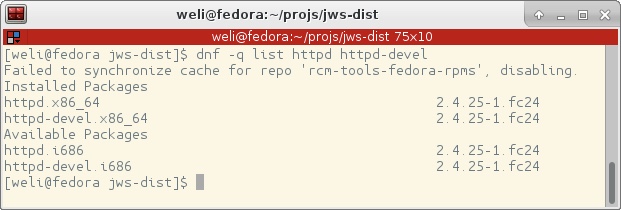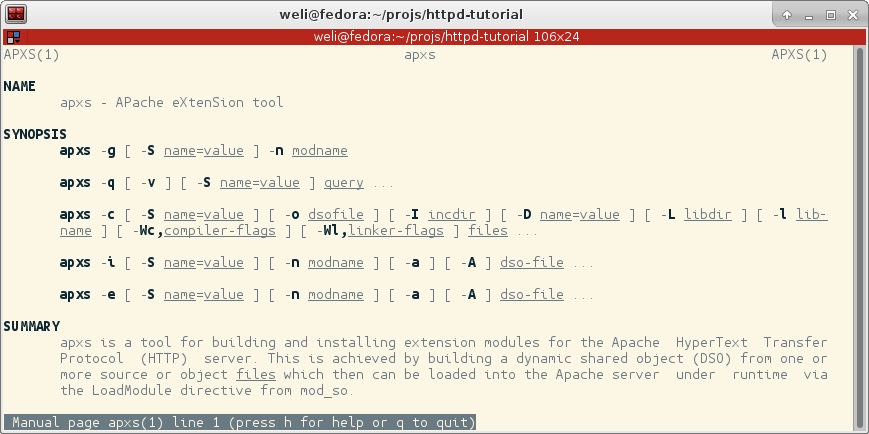Write An Apache HTTPD Module
Write An Apache HTTPD Module
In this article I’d like to show you how to write a module for Apache HTTPD.
I’m using Fedora Linux, So I can use the httpd and httpd-devel provided by system:

The reason to install httpd-devel is that we need the header files relative to module development provided by it1. Now let’s write a simple module:
// foo_module.c
#include <stdio.h>
#include "apr_hash.h"
#include "ap_config.h"
#include "ap_provider.h"
#include "httpd.h"
#include "http_core.h"
#include "http_config.h"
#include "http_log.h"
#include "http_protocol.h"
#include "http_request.h"
static int foo_handler(request_rec *r) {
if (!r->handler || strcmp(r->handler, "foo_handler")) return (DECLINED);
ap_set_content_type(r, "text/html");
ap_rprintf(r, "Hello, martian!");
return OK;
}
static void foo_hooks(apr_pool_t *pool) {
ap_hook_handler(foo_handler, NULL, NULL, APR_HOOK_MIDDLE);
}
module AP_MODULE_DECLARE_DATA foo_module = {
STANDARD20_MODULE_STUFF,
NULL,
NULL,
NULL,
NULL,
NULL,
foo_hooks
};
This module will use AP_MODULE_DECLARE_DATA to register a foo_module:
module AP_MODULE_DECLARE_DATA foo_module = ...
And it will use foo_hooks to call ap_hook_handler, and ap_hook_handler will load our foo_handler into httpd:
static void foo_hooks(apr_pool_t *pool) {
ap_hook_handler(foo_handler, NULL, NULL, APR_HOOK_MIDDLE);
}
Our main function foo_handler is very simple. You can see it doesn’t deal with request_rec. It will just output some HTML data:
ap_set_content_type(r, "text/html");
ap_rprintf(r, "Hello, martian!");
As we have understood the meaning of this simple module, now we can compile it. Apache HTTPD has provided a module compiling and installing tool for us called apxs:

We can use it to compile our foo_module:

As the snapshot shown above,we have used apxs to compile foo_module.c:
$ apxs -a -c foo_module.c
The output of compling process is like this:
/usr/lib64/apr-1/build/libtool --silent --mode=compile gcc -prefer-pic -O2 -g -pipe -Wall -Werror=format-security -Wp,-D_FORTIFY_SOURCE=2 -fexceptions -fstack-protector-strong --param=ssp-buffer-size=4 -grecord-gcc-switches -specs=/usr/lib/rpm/redhat/redhat-hardened-cc1 -m64 -mtune=generic -DLINUX -D_REENTRANT -D_GNU_SOURCE -pthread -I/usr/include/httpd -I/usr/include/apr-1 -I/usr/include/apr-1 -c -o foo_module.lo foo_module.c && touch foo_module.slo
/usr/lib64/apr-1/build/libtool --silent --mode=link gcc -Wl,-z,relro,-z,now -o foo_module.la -rpath /usr/lib64/httpd/modules -module -avoid-version foo_module.lo
As the output shown above, we can see apxs used libtool to compile our module, and generated many files:
$ ls
foo_module.c foo_module.la foo_module.lo foo_module.o foo_module.slo
There are also generated files in .libs directory:
$ ls -l ./.libs/
total 104
-rw-rw-r--. 1 weli weli 35580 Jan 27 02:55 foo_module.a
lrwxrwxrwx. 1 weli weli 16 Jan 27 02:55 foo_module.la -> ../foo_module.la
-rw-rw-r--. 1 weli weli 938 Jan 27 02:55 foo_module.lai
-rw-rw-r--. 1 weli weli 35432 Jan 27 02:55 foo_module.o
-rwxrwxr-x. 1 weli weli 25560 Jan 27 02:55 foo_module.so
Most of the files on above are intermediate libraries genereated during compile process, what we care is the shared library, which is .so file. This is the module file that can be loaded by Apache HTTPD.
Nevertheless, we don’t have to install the module manually, we can also use the apxs utility to install it to default httpd installation location. Here is the command to install the module:
$ sudo apxs -i foo_module.la
Please note we have used sudo to invoke apxs, because the module will be installed to system provided httpd, and its directories need root permission to modify. In addition, the foo_module.la is a libtool description file that describes the libraries it generated, and it is a pure text file if you’d like to check. Here is the output of above command:
/usr/lib64/httpd/build/instdso.sh SH_LIBTOOL='/usr/lib64/apr-1/build/libtool' foo_module.la /usr/lib64/httpd/modules
/usr/lib64/apr-1/build/libtool --mode=install install foo_module.la /usr/lib64/httpd/modules/
libtool: install: install .libs/foo_module.so /usr/lib64/httpd/modules/foo_module.so
libtool: install: install .libs/foo_module.lai /usr/lib64/httpd/modules/foo_module.la
libtool: install: install .libs/foo_module.a /usr/lib64/httpd/modules/foo_module.a
libtool: install: chmod 644 /usr/lib64/httpd/modules/foo_module.a
libtool: install: ranlib /usr/lib64/httpd/modules/foo_module.a
libtool: finish: PATH="/sbin:/bin:/usr/sbin:/usr/bin:/sbin" ldconfig -n /usr/lib64/httpd/modules
----------------------------------------------------------------------
Libraries have been installed in:
/usr/lib64/httpd/modules
If you ever happen to want to link against installed libraries
in a given directory, LIBDIR, you must either use libtool, and
specify the full pathname of the library, or use the '-LLIBDIR'
flag during linking and do at least one of the following:
- add LIBDIR to the 'LD_LIBRARY_PATH' environment variable
during execution
- add LIBDIR to the 'LD_RUN_PATH' environment variable
during linking
- use the '-Wl,-rpath -Wl,LIBDIR' linker flag
- have your system administrator add LIBDIR to '/etc/ld.so.conf'
See any operating system documentation about shared libraries for
more information, such as the ld(1) and ld.so(8) manual pages.
----------------------------------------------------------------------
chmod 755 /usr/lib64/httpd/modules/foo_module.so
The important line is at the bottom of above log, from which we can see foo_module.so is installed to the default installation location of Fedora Linux provided httpd.
The above apxs command will just install the .so file into httpd module directory, but it won’t load it in httpd config file for you. If you’d like to activate your module by adding it into httpd config file, you can use the following command:
$ sudo apxs -ia foo_module.la
And this time there is an additional line in the output:
chmod 755 /usr/lib64/httpd/modules/foo_module.so
[activating module 'foo' in /etc/httpd/conf/httpd.conf]
As the log shown above, we can see foo module is added into /etc/httpd/conf/httpd.conf, and we can check it:
$ grep foo /etc/httpd/conf/httpd.conf
# LoadModule foo_module modules/mod_foo.so
LoadModule foo_module /usr/lib64/httpd/modules/foo_module.so
Now we should configure the module in httpd. From the source code of the module we saw:
static int foo_handler(request_rec *r) {
if (!r->handler || strcmp(r->handler, "foo_handler")) return (DECLINED);
ap_set_content_type(r, "text/html");
ap_rprintf(r, "Hello, martian!");
So if the handler name is set to foo_handler, it will accept the request and return a simple text to the client. We can add following lines into httpd.conf:
<Location /foo>
SetHandler foo_handler
</Location>
With the above configuraton, we set the foo_handler to serve the location /foo, and our module will be used to deal with this location. Now we can start the httpd server:
$ sudo service httpd start
Redirecting to /bin/systemctl start httpd.service
If the service started correctly, we can see from the log like this:
$ systemctl status httpd.service
● httpd.service - The Apache HTTP Server
Loaded: loaded (/usr/lib/systemd/system/httpd.service; disabled; vendor preset: disabled)
Active: active (running) since Thu 2017-04-13 18:04:46 CST; 20s ago
Main PID: 16184 (httpd)
Status: "Total requests: 0; Idle/Busy workers 100/0;Requests/sec: 0; Bytes served/sec: 0 B/sec"
Tasks: 32 (limit: 512)
Memory: 3.9M
CPU: 133ms
CGroup: /system.slice/httpd.service
├─16184 /usr/sbin/httpd -DFOREGROUND
├─16211 /usr/sbin/httpd -DFOREGROUND
├─16212 /usr/sbin/httpd -DFOREGROUND
├─16213 /usr/sbin/httpd -DFOREGROUND
├─16214 /usr/sbin/httpd -DFOREGROUND
└─16215 /usr/sbin/httpd -DFOREGROUND
Apr 13 18:04:37 fedora.shared systemd[1]: Starting The Apache HTTP Server...
Apr 13 18:04:46 fedora.shared systemd[1]: Started The Apache HTTP Server.
Now we can access the location /foo to see if our module works properly:
$ curl http://localhost/foo
Hello, martian!
As the command output shown above, our module works as expected.
References
-
Kew, Nick. The Apache modules book: application development with Apache. Prentice Hall Professional, 2007. ↩